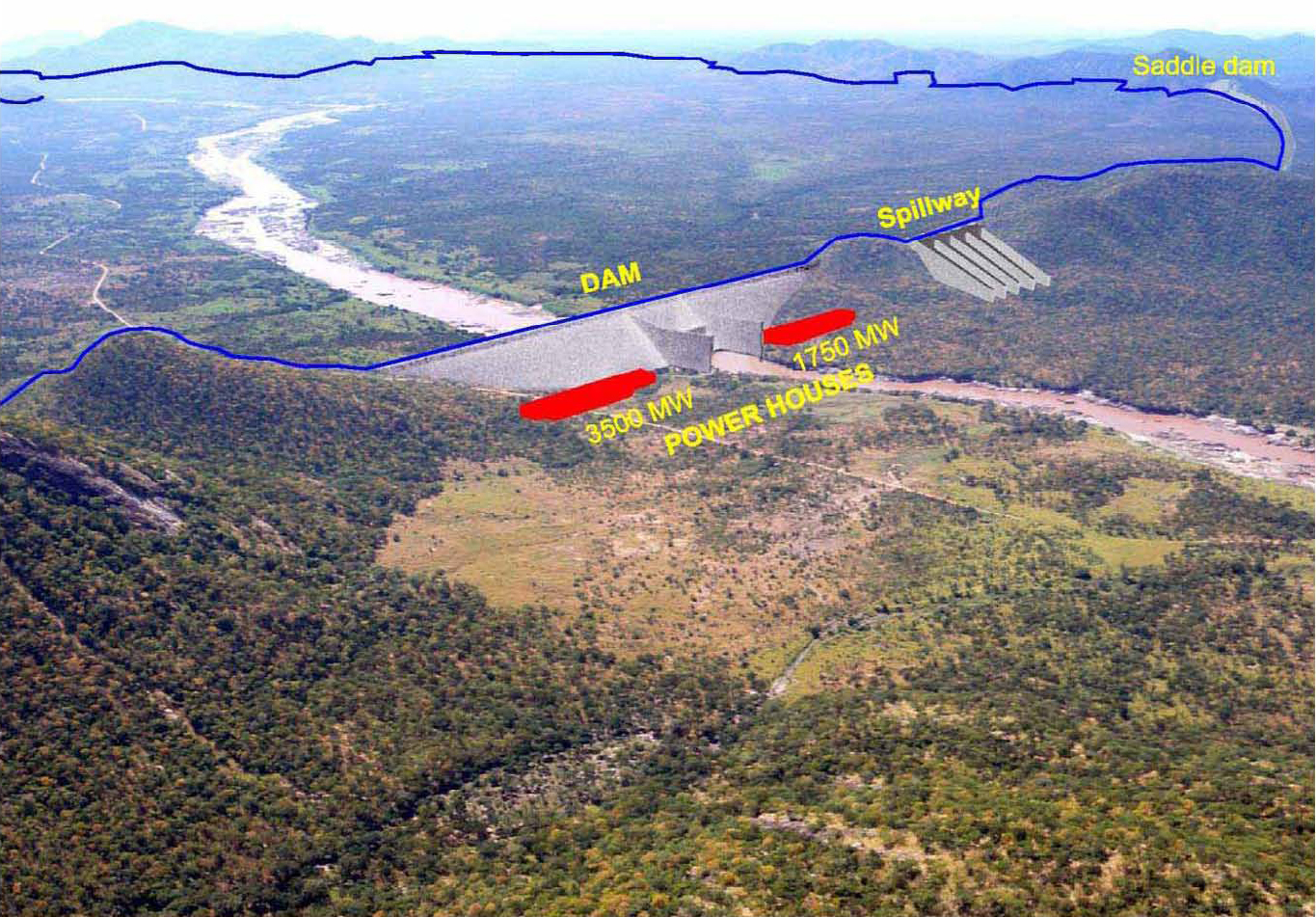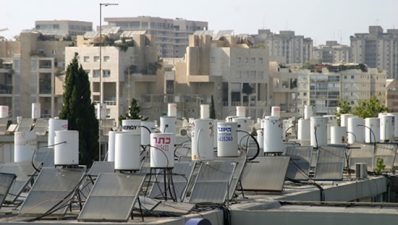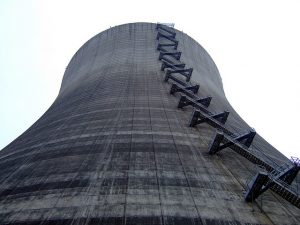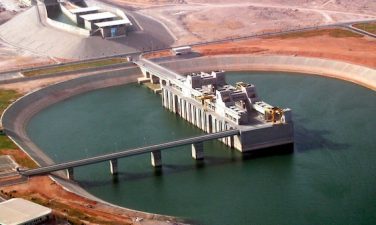In a strange and surprising twist, Egypt says it will consider participating with its neighbour Ethiopia in the construction of the Renaissance Dam, a project which it had staunchly opposed (and even suggested sabotaging).
The dam known formally as the Grand Ethiopian Renaissance Dam will provide much-needed hydro-power to Ethiopia, but downstream it is expected to change the face of the Mighty Nile and the Fertile Crescent as we know it.
According to Al Monitor, Ethiopia’s Prime Minister Hailemariam Desalegn announced that his country welcomes the participation of Egypt and Sudan in the construction of the dam and stressed that his government considers the dam will be jointly owned by Sudan, Ethiopia and Egypt.
Cairo viewed this statement as a positive step toward reaching a consensus on the Nile project, despite its earlier sharp criticism of it.
Egyptian Minister of Water Resources and Irrigation Mohamed Abdul Muttalib said: “Egypt doesn’t mind joining the Ethiopian government in building the dam for the service and development of the Ethiopian people. But we must agree on a number of items in a clear way to prevent any damage to Egypt as a result of the dam construction.
“During the coming negotiations with Ethiopia over the dam, we will clarify our position regarding the policy and method of operating the dam, the size of the storage lake attached to it, and how to fill it with water in times of flood and drought.”
He stressed, “Egypt will definitely not participate in the construction unless these policies are agreed upon and agreements regarding them are signed.”
The Renaissance Dam is an under-construction gravity dam on the Blue Nile River in Ethiopia. It is located in the Benishangul-Gumuz Region of Ethiopia, about 40 km (or 25 mi) east of the border with Sudan.
Currently Egypt gets about 55 million cubic meters of water from the Nile each year through agreements it had signed with Sudan and Ethiopia in 1959. But times have changed, populations have grown and the power needs of the region have outpaced their desire to maintain old contracts.
The majority of the Nile water that Egypt receives comes through Ethiopia, a people who are clearly passionate about how they want to govern their future.
Safety concerns of the future dam, which will generate 6,000 MW, have been brought up; lasting effects to the people who sustain themselves with the Nile are an obvious concern especially for Egyptians.
Meanwhile the media speculate that this move by Egypt is less goodwill than playing its cards while the political turmoils that have taken over the country simmer down.
While dams are a straightforward and somewhat “green” source of hydro-power, there are lessons to be learned from countries that construct them. Thailand, China, Canada, the United States have all constructed major hydro-electric dam projects which have resulted in massive changes to the natural and built environment.
For a country like Egypt which seems to be hanging precipitously by a thread, a change to its precious Nile could spell out disaster.
There is a wonderful historical and academic article here on Origins if you want to delve deeper into the significance of the Nile to countries like Egypt and Sudan.
According to Origins, “Since the twelfth century C.E. Christian Ethiopian kings have warned Muslim Egyptian sultans of their power to divert waters of the Nile, often in response to religious conflicts. But these were hypothetical threats.
“Today, however, Ethiopia is building the Grand Renaissance Dam and, with it, Ethiopia will physically control the Blue Nile Gorge—the primary source of most of the Nile waters.”
Any changes to the Nile will force world powers in the region to adjust. This Green Prophet would rather see Ethiopia (defiant about its dam) develop solar power than to make sweeping changes to the ebb and flow of the mighty Nile.
When completed, the Renaissance Dam – formerly known as the Millennium Dam and sometimes referred to as Hidase Dam – will be the largest hydro electric power plant in Africa.
Egyptian, Sudanese and Ethiopian ministers will soon meet to discuss the dam, hopefully under civil terms.
According to Wikipedia Egyptian tactics weren’t so diplomatic in the recent past: “On 3 June 2013 while discussing the International Panel of Experts report with President Mohammad Morsi, Egyptian political leaders suggested methods to destroy the dam, including support for anti-government rebels.”
The speakers didn’t realize they were being televised live. Oops.
Image via seeker





Egypt has the largest military in Africa, she may have to use it if the Nile is threatened. Without the Nile, there is no Egypt.
You guys in Egypt are still trying to impose Arab supremacism on black Africans? I don’t care how powerful the Egyptian military is, it will not be pretty for Egyptians. Egyptians are too busy killing each other to even coordinate an attack on Ethiopia. And you are all the ones concerned about a collapse. Besides, Ethiopia would just take the case to an international court… playing your game. I wonder what China and other foreigners working on the dam would say about Egypt. If anything is certain, Ethiopia would have more justification to be wary of you for all of the underhanded things Egypt has done in the past. But apparently they are not vindictive like you are. They have actually tried to work with you. In 1929 and 1959 you all did no such thing. Come to think of it, maybe this saber rattling from Egypt is rooted in a guilty conscience.
So what’s happening now as the dam nears completion? What’s the feeling on the ground?
It is sickening to see people who claims to be environmentalists without even understanding what the building blocks of natural Resources Management. The write may need a bit of support in understanding the concepts of cross-country river water management including ‘upstream-downstream relationships’, ‘multiple use of water for fishing, hydropower, tourism, irrigation’, ‘benefit sharing mechanisms’ and ‘integrated river basin management’, which would help her to understand the issues before providing recommendations. As it is now, it looks like it was written by a person without biology 101, let alone an environmental writer. Please, the readers are looking for evidence on long term management strategies for the basin that would help policy makers negotiate based on facts. If the article is meant to buy sympathy from the Egyptian public for your troubled country, you will never get it.
Egypt already changed the Nile’s course considerably by building the Aswan Dam. Now they want to help create even more harm to the river as well as their own delta region? The Egyptian government (such as it is) better think again before doing this.
Oh yeah? Who are you to tell us to rely on a very expensive, tech intensive energy source even the wealthy western countries are struggling to develop? Thanks, but no thanks.
As for the 1959 treaty, which we never signed, it is like your two neighbors sign a deal to take your house and share it between themselves without even telling you. If you would honor that, we will give up our rights to the nile waters to our neighbors. Millions of our people died of starvation while we were denied the funding to develop our resources. World bank should stop playing politics while making funds available for developing countries. I believe their main purpose is to help third world countries develop their resources and reduce poverty. We will face obstacles along the way, but eventually we’ll defeat poverty.
Read more before you write!!! We have never signed any agreement with Egypt in 1959.
THE NEXT THING FOR EGYPT WILL BE TO LAY CLAIM ON ETHIOPIA’s 12 rivers, as a god given gift to Egypt.after they tell Ethiopia how to fill the dam water in times of drought and flood! as if EGYPT has any of those time of flood water.
The author of the article need to apologise for the wrong information he has created in this article. He either lacks an accurate knowledge about the signed treaties or consciously misguiding the truth for mere purpose of misinforming readers. Ethiopia has never signed the 1959 Nile water utilisation agreement. That agreement had been signed by Egypt and Sudan on the basis of the 1929 agreement that was signed with their former colonial masters. Both agreements are not accepted by upstream countries including Ethiopia as they are considered as the British divide and rule colonial policy extension. Had the author ever knew that Ethiopia hasn’t been colonised and wouldn’t be represented by any colonial power treaty in respect to how it utilises its natural resources?
reallly? You call yourself a writer? Ethiopia had never signed any agreement with sudan and egypt in 1959. And you said the major part of the water egypt uses from the nile passes through ethiopia, IT ORIGINATES IN ETHIOPIA MAKE FACTS STRAIGHT IT PASSES
THROUGH SUDAN TO YOU ARROGANT SELFISH PEOPLE. actually i didnt read more than these sentences, cause it is not worth reading and good luck to you in to trying deceive people in lying them what everybody knows is true.
All Middle eastern and north african countries need family planning. They won’t have enough water to drink in anther 25 years. It is not Ethiopia’s problem MF!
Tha goes for Egypt idiot. If you don’t have water you call your own then manage your population. Ethiopia has the Natural resource to feed itself, I used well. Water an all.
Well, greet prophet. NO Ethiopian is asking for your opinion. Not only are we passionate but we are determined to utilize our God given resources however we want. Why don’t you make the same suggestions to the Egyptians ? They can definitely use their solar power, which they have plenty of, instead of hydro power. Who are you to dictate what one country can and what it can’t? How much oil money are they paying you. They have been meddling in our affairs and now very simply they are brought to their knees.
Instead of building dams, build recycling stations and family planning clinics, and plant trees and family gardens.
Are you kidding? That’s not going to stop power outages nor help them develop and build more modern housing, hospitals, and educational centers. You’re just damming them to more people dying of diseases preventable by having electricity for sanitation, cooking and storing food. Education is hampered by the lack of electricity. You can’t run classrooms efficiently without lights, heating, cooling or functioning electrical outlets.
This isn’t some hyper-romantic environmentalist utopia here. These are people trying to defeat poverty once and for all. You want to sustain it, because you see these people as noble peasants living close to nature and are therefore more morally noble than those of us who live in the smog filled carbon dioxide emitting industrial West. Oh how nice of you, but I know racism cloaked in compassion when I see it.
No you do not! It is NOT racism. The greed of both sides is very very sad. A pox on both your houses! The ignorance of those replying to this site with out having a clue to what it is about, is depressing. And assuming the article is written by a male person is disgusting. Such greed and hatred clothed in utter ignorance of our shared humanity.
Teresa,
Do you know how much electricity an Ethiopian gets a year. Less than what you spent lighting your house in a day. Now tell me is trying to improve that greed. This is so unfair – I do not even know where to begin. The Egyptians and all their supporters are the greedy ones. The writer of this article – it does not matter male or female – is also ignorant. She does not even have the basic facts right. You side with her and call us Ethiopians greedy wow Teresa where is your sense of fairness
Greed? So where’s the middle ground here? If Ethiopians are starving, everyone weeps endlessly and American and British celebrities do benefit concerts, and all the other activities of feel-goodness that don’t actually do anything to destroy poverty. On the other hand, when Ethiopians are about to revolutionize their economy – without Bob Geldof’s help – all of a sudden Ethiopians are considered greedy. So they deserve sympathy when they suffer and deserve scorn when they thrive? It’s just like the foreign aid model – Africans get what they need to survive for a while and yet not enough to be self-reliant. They just remain in a statis of dependency on foreign governments. Now, most of these aid organizations are run by white Leftists. Now after 50 or more years of 1 trillion dollars in aid to Africa, that has not reduced poverty, wouldn’t these intelligent and supposedly informed people by year 20, realize that the method isn’t working? That tells me all of this compassion for Africans is simply a facade for white paternalism, trying to convince these people that living on rations is much more fitting for their “tradition” and “way of life” and that evil industrialization will corrupt them. Trust me, these type of people are racist. Environmentalists banned the use of DDT, the most effective pesticide against malaria, which could have wiped out malaria in Africa and Asia. Why would they do something like that? For a few birds?